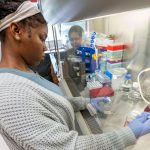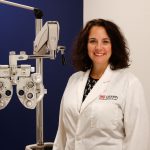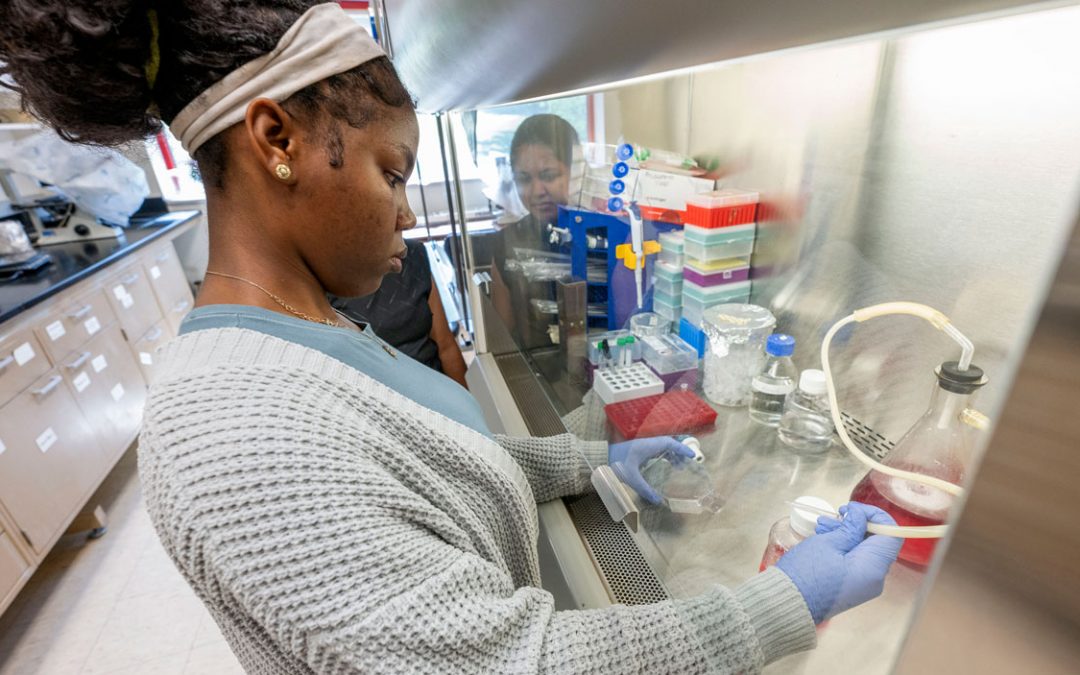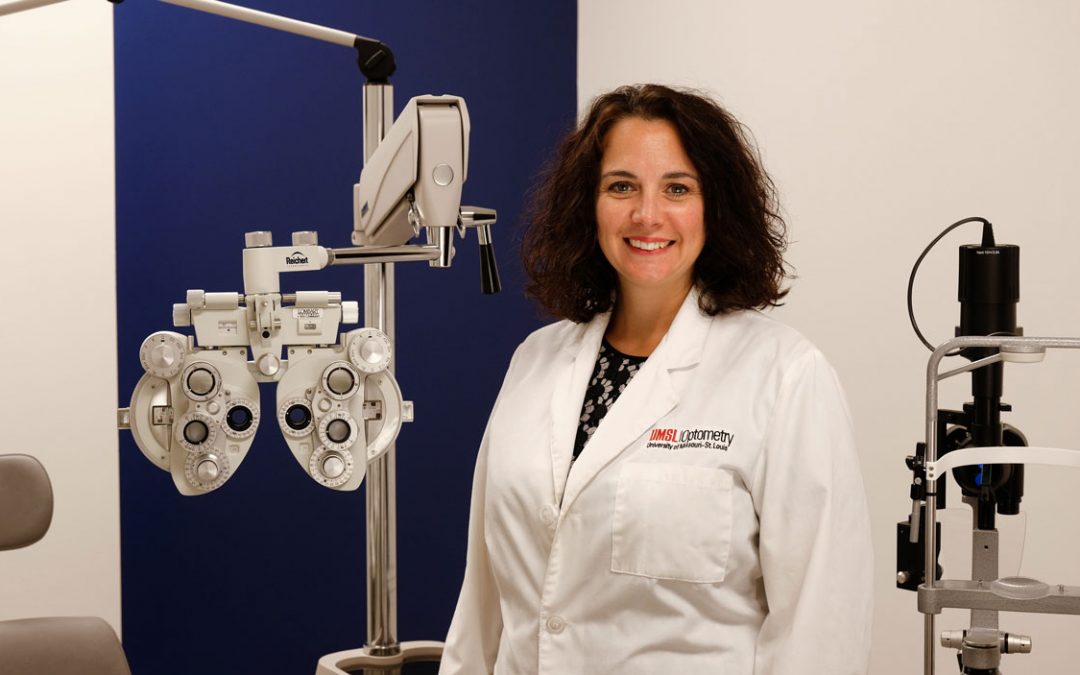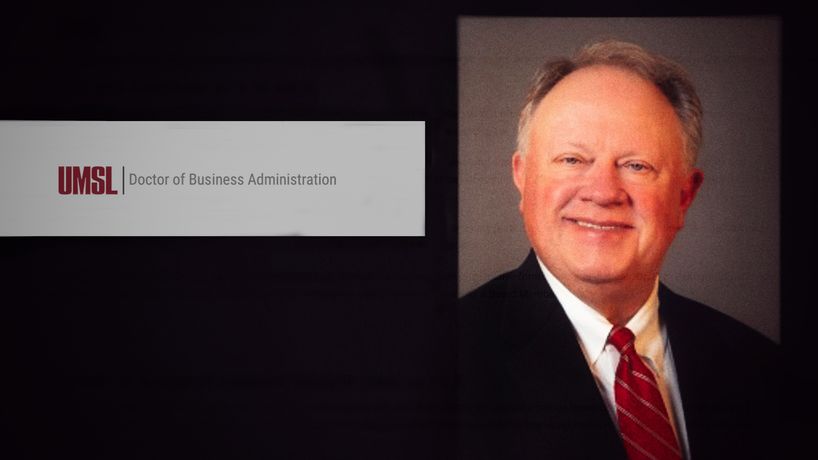
Rodney Carmack, an assistant professor of accounting at Arkansas State University, will honor his father’s memory by becoming the first person in his family to hold a doctorate when he graduates with his DBA. (Photos courtesy of UMSL DBA)
Around a century ago, Dunklin County, Missouri, had few doctors and a lot of area to cover, with mostly dirt roads, so midwives usually delivered babies.
Rodney Carmack’s grandmother served as a midwife and would often take her young son, William Quentin Carmack, with her when she visited patients. Over time, people began referring to the child as the “little doc.” When William reached 6 feet, 4 inches tall, “little” was dropped and William – who had only a fourth-grade education – was known as “Dock” for the rest of his life.
When his son began pursuing a DBA at the University of Missouri–St. Louis, things came full circle. After successfully defending his dissertation, Carmack will graduate from the College of Business Administration as the first person in his family to hold an official doctorate.
“It honors my father’s memory,” Carmack said. “His youngest son is now a doctor. It took a while, but we got there.”
Carmack grew up in Kennett, Missouri, and although his parents never had the chance for education beyond elementary school – his mother had only a sixth-grade education – their goal was for their son to graduate high school.
After graduation, Carmack pursued a speech communication degree at Southeast Missouri State University, a degree he chose after participating in a theater production. But two years later, he decided to change course.
The next step took him to Arkansas State University to pursue a bachelor’s and later a master’s in accounting, a field that had come across his radar in high school.
“I had the skill sets,” he said. “I was very fortunate with the high school that I went to in a town that values education. I was given a couple of tests my senior year, and they all said I should be an accountant. Coming from the background I had, I didn’t know anything about it and was reluctant to do it.”
But as he learned more about the business world, he realized that his analytical skills and deductive reasoning were ideal for accounting. After earning his degree, he worked in public accounting for six years then switched to industry. He spent almost 20 years as a plant controller at the Anheuser-Busch agricultural facility in Jonesboro, Arkansas. During that time, he also finished his degree in speech communication 31 years after he began it.
After leaving Anheuser-Busch, he began teaching accounting at Arkansas State. He is now an assistant professor of accounting, where he focuses on financial and managerial accounting.
In 1986, after finishing his master’s degree, he looked into pursuing a PhD but decided to go into the business world to better support his family. A few years ago, a colleague told him about a new DBA program at UMSL, and Carmack saw an opportunity to balance his real-world experience with a doctoral degree and achieve a long-held dream.
“It wasn’t a question of if,” he said. “The question was ‘Will you take me and will you let me do my best?’”
He quickly discovered that the faculty, who he characterized as “phenomenal,” would not only encourage him to do his best but would help him achieve things he hadn’t expected.
He recalled a class early in the program that had very little to do with the analytics of numbers and data to which he was accustomed. For two months, Carmack worked to grasp the subject matter.
“I struggled and struggled with it,” he said. “Then all of a sudden, it clicked. The professor was pushing me to grow, and as much experience and training as I had, I didn’t recognize it at first. But I saw it happening throughout the program. I gained a lot from that. I would challenge anyone to find a better program in the United States that provides a better benefit to the students. It’s very special.”
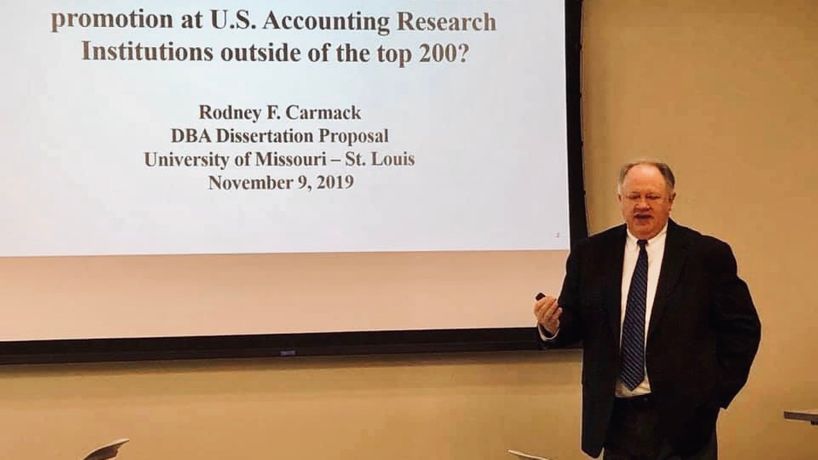
Rodney Carmack presents his dissertation on promotion and tenure standards for accounting faculty outside the top 200 U.S. colleges and universities.
Carmack’s final challenge in the DBA program was his dissertation, which explored promotion and tenure standards for accounting faculty at U.S. colleges and universities outside the top 200.
He began researching in September 2019 by looking at a master list of accounting faculty at U.S. institutions. Carmack eliminated the top 200 schools and compiled a random sample of 83 schools and 771 faculty members.
From February to July, he pored over faculty lists and journals, sitting in front of two computer monitors – one with multiple tabs displaying journal articles and another with an Excel sheet of citations.
“I had a very broad pool of individuals, because I had to narrow it down and identify individuals who were promoted over a seven-year time period,” he said. “I ended up having 36 universities and 66 faculty. Then I had to analyze what they published, how many journals they published in, frequency of publications. I compared that to the literature on the top 75 schools based on the journals they published in.”
His research revealed that, compared to top 200 schools, the faculty members who had been promoted had papers published more frequently but in lower ranked journals. He noted that it’s difficult for those faculty to have their work included in elite publications.
“The promotion and tenure process at universities is critical to the continued growth and development of the various colleges,” said Steve Moehrle, professor of accounting and Carmack’s dissertation chair. “Rodney’s dissertation is designed to inform that important operational issue at colleges. For about the past 15 years, scholars out of Brigham Young University have provided the academic community with valuable benchmarking data to inform the process. Rodney’s work contributes to this literature by providing data to inform the promotion and tenure process at the ‘mid-major’ accounting programs across the country. The fruit of Rodney’s work will be used to inform promotion and tenure decisions at accounting programs for years to come.”
His dissertation melds well with his work as an accounting instructor, where he focuses on preparing his students for the workforce they will encounter after graduating and strives to contribute to their success.
Carmack’s efforts were acknowledged three years ago when Arkansas State named him the recipient of an Excellence in Undergraduate Teaching Award. It marked the first time the award’s winner was not a tenure-track professor.
“I didn’t go to the awards ceremony because I was grading tests,” he said. “All of a sudden, my phone lit up and several people took pictures of the presentation of the award winner for excellence in undergraduate teaching, and underneath it was my name. I was in shock; I did not think I was eligible for the award since, at that time, I was not a tenure-track faculty member. Quietly, the College of Business had changed the rules to allow me to earn the award. I contribute, and that’s what keeps me motivated.”
Outside of work, Carmack maintains balance through gardening and woodworking. Above all, he values spending time with his wife of 36 years, his two children and his 5-year-old grandson, Quinton, named after Rodney’s father.
“I have a philosophy that there are three facets to overall wealth,” he said. “The first is financial. That’s where most people immediately go, but it’s only one of the three. Another is family and friends; the support afforded by these individuals is immeasurable. The third leg is faith. Faith can be manifested in different forms – faith in a higher being, faith in others, faith in yourself. All three facets have to be in balance or you’re going to struggle through life.”


